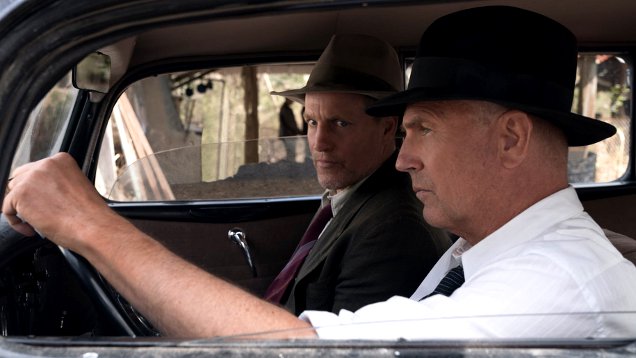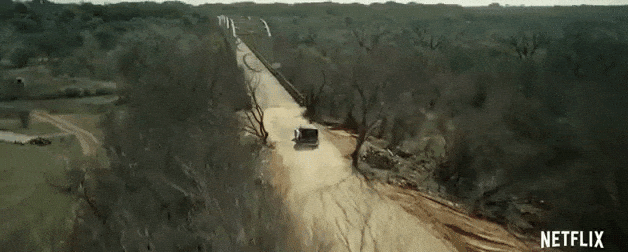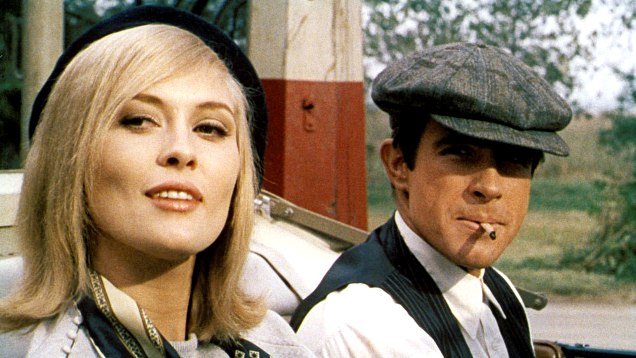The politics of Netflix’s Bonnie and Clyde-hating police drama The Highwaymen

Netflix’s new period drama The Highwaymen applies conservative politics to the legend of Bonnie and Clyde, reframing it as a story about triumphant law enforcers. The film is ideologically interesting but also problematic, writes Luke Buckmaster.
The most important line of dialogue in director John Lee Hancock’s glossy period piece The Highwaymen, which combines the aesthetic principles of high-end drama with a police procedural narrative, arrives early in the piece. It’s 1934 and the governor of Texas, Miriam “Ma” Ferguson (Kathy Bates) is asked whether the famous outlaws Bonnie Parker and Clyde Barrow are comparable to Robin Hood. Without batting an eyelid she responds: “Robin Hood never shot a gas attendant point blank in the face for four dollars.”
This line goes to the heart of the film’s very reason for being, Hancock and screenwriter John Fusco viewing art as a kind of tool for ideological correction. They revisit the story of Bonnie and Clyde in order to reframe it as a tale about conservative values, led by two hard-working Texas Rangers – Frank Hamer (Kevin Costner) and Maney Gault (Woody Harrelson) – who put an end to the outlaws’ reign of terror. Their film is critical of a society (particularly youth) which makes heroes out of monsters, prioritising trendy aspects of the zeitgeist over essential human decency.
At one point Frank observes pro-Bonnie and Clyde graffiti sprayed on the side of a water tank, seconds before a carload of rambunctious lead-footed youth roar down the road, acting as if they own it. In another he believes for a moment that they have found Bonnie Parker – only to realise he and his partner are looking at one of many women inspired by her fashion sense. In this moment Maney ruefully acknowledges that the Bonnie Parker look is “all the rage.”
Interactions like these, as well as pace-slowing factors such as periodic detours into leisurely monologues, not entirely unlike Abe Simpson’s famous “onion on my belt” speech, gives The Highwaymen an old-timey, tang-scented flavour. Annoyingly, many of the most interesting parts of the story have transpired before the characters arrive on the (crime) scene. Costner and Harrelson, with their craggy stubble-splotched faces and pathos-o-matic presences, make it further clear that this film is a bit of a dad’s movie.

With its preference for confected beauty over dramatic edge – for Hollywood artifice over gritty texture – The Highwaymen is reminiscent of another Hancock-directed period drama: 2013’s Saving Mr. Banks. That slab of shiny flapdoodle, replete with corny monologues about the redemptive powers of the imagination, is a deceptive exercise in corporate mythmaking. One scene shows the prickly Mary Poppins author P.L. Travers (Emma Thompson) crying while at the premiere of Disney’s adaptation of her book. As I wrote in my review of the film, published five years ago:
“By all accounts she cried, but not for reasons the Mouse would like you to believe. The dramatic meaning of the scene is crystal-clear: those tears were salty driblets of relief, marking a moment when pent-up angst softened into a puddle of catharsis. The truth is that the author hated what she saw and bitterly resented Disney for the rest of her life.”
Hancock’s following two features are at least ideologically interesting. The McDonald’s origins pic The Founder, starring Michael Keaton as the fiendish Ray Kroc, espouses a sort of nostalgic conservatism, with a message that decent folk once prided themselves on producing quality goods at an affordable price – before Mr Big Business roared into town and ruined everything. In The Highwaymen, with Bonnie and Clyde being mobbed by adoring fans and Costner concluding that “those kids you grew up with aren’t human anymore,” the focus again is on a world that isn’t as pure (or as gosh darn American) as it used to be.
Conservative people often embrace this kind of mentality, holding onto a belief that the world was a better place back in the good old days. They romanticise bygone eras and prefer policies grounded in the past, hoping to rekindle something they believe was lost. Progressives such as Barack Obama use inspirational slogans such as “Forward” and “Yes We Can”, while conservatives like Donald Trump more often choose backwards-thinking mottos like “Make America Great Again.”
Part of the mission statement of The Highwaymen was obviously to ‘correct’ Arthur Penn’s 1967 classic Bonnie and Clyde, the best-known and most influential of films about the legendary criminals. Both productions capture elements of their respective political ideologies. Bonnie and Clyde for example, like the best in progressive politics, is exciting, edgy, bold and different. At the time of release it wowed audiences, and culminated in a taboo-busting final sequence that shook the foundations of Hollywood.

The Highwaymen, like conservative politics, is sober and unadventurous, projecting a more sensible aura. From a moral point of view it is also a black and white experience. While Penn’s film embraced countercultural attitudes (such as skepticism towards big financial institutions) and to some extent glamourised the outlaws, it nevertheless allowed the viewer room to apply their own moral framework, not insisting that its subjects were either commendable or condemnable.
Watching The Highwaymen, on the other hand, it is virtually impossible to interpret the underlying message as anything other than that Bonnie and Clyde were murderous scumbags who deserved to be dealt swift and brutal justice. Perhaps that is true. But by jamming the message down our throats, the film becomes dictatorial: an ‘our way or the highway’ experience with no claim to moral complexity. By ‘correcting’ the scales, John Lee Hancock and co. have in fact bent them in all sorts of directions. Or maybe just in a single direction: to the right. If nothing else, the film is an interesting reminder that history is fluid. The past never changes, but the way we remember it certainly does.
















